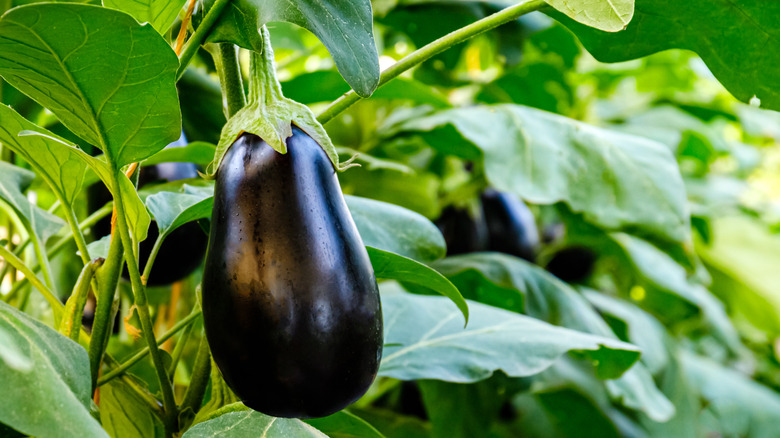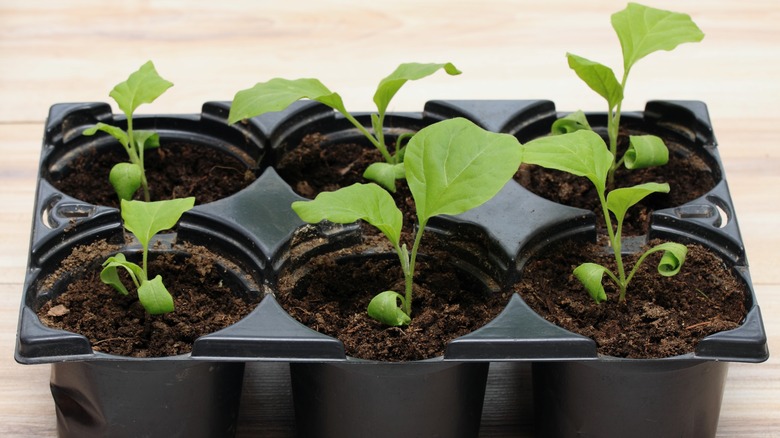The Best Time Of Year To Grow Eggplant In Your Garden
Their regal purple color suggests that eggplants might be a royal pain to grow, and that's partially true. Starting from the beginning, you'll want to plant your eggplants during the late spring or summer, when temperatures are consistently warm and there's no chance of frost. They grow best in USDA hardiness zones 9 through 12, so if you live in a much cooler climate, you may have trouble growing these plants. Even though they're a bit difficult to cultivate, it's a highly rewarding experience to watch these gorgeous fruits growing in your garden.
There are a few must-haves if you're going to make like a bandit during your eggplant harvest, and all of them are non-negotiables. First off, you'll want to find a sunny spot in your garden that will allow your eggplant shrubs to soak up at least six to eight hours of sunshine daily. These temperamental plants also require well-draining soil, so be sure to throw down some compost to keep the substrate fertile and drainage-friendly. You'll also need to stake up these plants so that they don't topple over. It's also important to mention that, like most scrumptious edible garden fare, eggplants are susceptible to pests like aphids, flea beetles, and whiteflies. These can all damage the foliage, which will reduce eggplant yields if you don't address them immediately. However, every good eggplant harvest begins with planting at the appropriate time of year.
When to plant depends on your climate
Eggplants thrive in warm climates, and their growth is influenced by the temperature and how many hours of sunlight they can get. It's generally recommended to plant these oblong fruits when temperatures are consistently hovering above 70 degrees Fahrenheit and the soil temperature is above 50 degrees Fahrenheit. If you live in a colder climate, you'll want to start your precious eggplants indoors to give them a fighting chance against any frosty invaders.
Get your hands on some top-notch seedlings from a reputable nursery or home and garden store. Or, if you're feeling adventurous, you can kick-start your eggplant brood by growing from seed and using indoor seedling trays. If you're going the indoor route, be sure to plant your seeds in the spring about six to eight weeks before you expect the last frost. Once your garden soil is feeling warm and frost is out of the picture, then it's safe to transplant those little sprouts. Be sure to give them some space to stretch out, or place them about 24 to 36 inches apart. Once you transplant them, add a bit of balanced fertilizer and then follow up with another feeding a few weeks later. Keep in mind that you're going to need some patience when growing these purple plants because they take around 65 to 85 days to reach maturity.
Eggplants like a consistent temperature
As you gear up for growing eggplants, keep in mind that it's all about timing. As previously mentioned, planting during the warmer months sets the stage for robust root growth and some super lush, green leaves. Eggplants are not fans of cold weather, which can really stunt or even halt their growth. If the temperatures drop below 55 degrees Fahrenheit, it's best to cover your plants with row covers. But here's the twist. While these royal fruits adore warmth, too much heat can also make them go south. They do not do well in extremely fluctuating temperatures.
Therefore, if your area is suddenly hit with a random every-100-year heat wave, you should expect that your eggplants are going to be hurting. If the sun is a scorcher year-round, you'll want to offer up some shade for your eggplants, especially if the temperatures rise above 95 degrees Fahrenheit during the almighty sun's peak hours. Mulching will also help maintain the right temperature and moisture levels as it keeps things nice and consistent, which is what eggplants crave.


